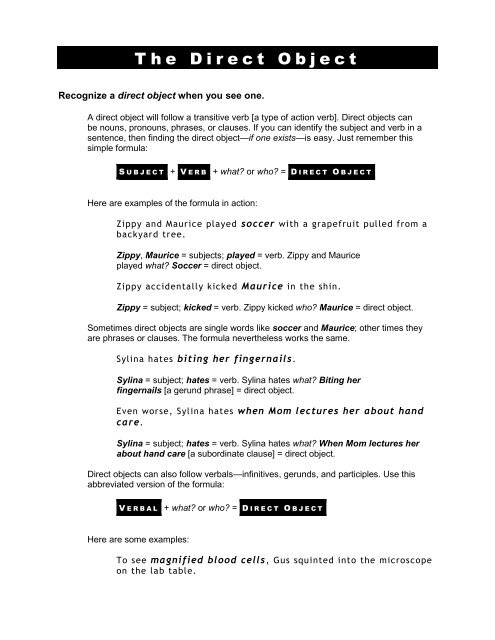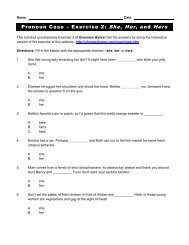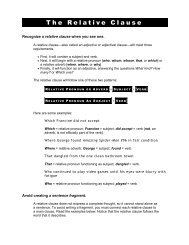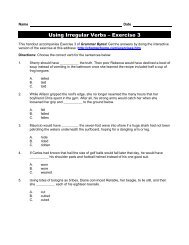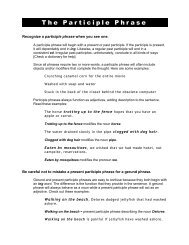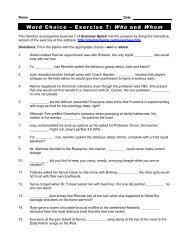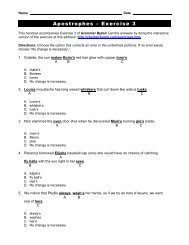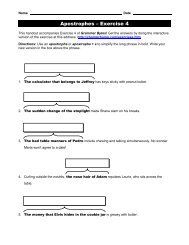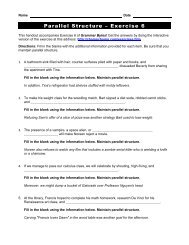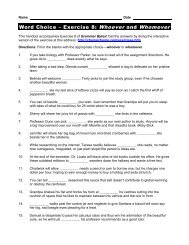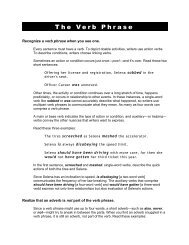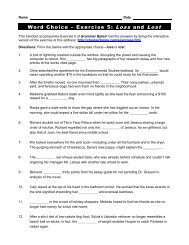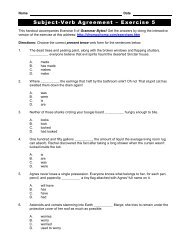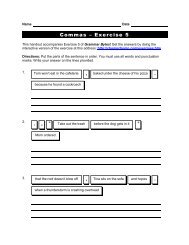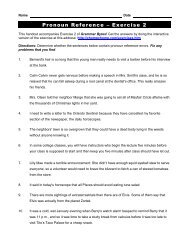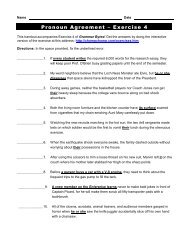Create successful ePaper yourself
Turn your PDF publications into a flip-book with our unique Google optimized e-Paper software.
T h e D i r e c t O b j e c t<br />
Recognize a direct object when you see one.<br />
A direct object will follow a transitive verb [a type of action verb]. <strong>Direct</strong> objects can<br />
be nouns, pronouns, phrases, or clauses. If you can identify the subject and verb in a<br />
sentence, then finding the direct object—if one exists—is easy. Just remember this<br />
simple formula:<br />
S U B J E C T + V E R B + what? or who? = D I R E C T O B J E C T<br />
Here are examples of the formula in action:<br />
Zippy and Maurice played soccer with a grapefruit pulled from a<br />
backyard tree.<br />
Zippy, Maurice = subjects; played = verb. Zippy and Maurice<br />
played what? Soccer = direct object.<br />
Zippy accidentally kicked Maurice in the shin.<br />
Zippy = subject; kicked = verb. Zippy kicked who? Maurice = direct object.<br />
Sometimes direct objects are single words like soccer and Maurice; other times they<br />
are phrases or clauses. <strong>The</strong> formula nevertheless works the same.<br />
Sylina hates biting her fingernails.<br />
Sylina = subject; hates = verb. Sylina hates what? Biting her<br />
fingernails [a gerund phrase] = direct object.<br />
Even worse, Sylina hates when Mom lectures her about hand<br />
care.<br />
Sylina = subject; hates = verb. Sylina hates what? When Mom lectures her<br />
about hand care [a subordinate clause] = direct object.<br />
<strong>Direct</strong> objects can also follow verbals—infinitives, gerunds, and participles. Use this<br />
abbreviated version of the formula:<br />
V E R B A L + what? or who? = D I R E C T O B J E C T<br />
Here are some examples:<br />
To see magnified blood cells, Gus squinted into the microscope<br />
on the lab table.
To see = infinitive. To see what? Blood cells = direct object.<br />
Gus bought contact lenses because he wanted to see the<br />
beautiful Miranda, his lab partner, more clearly.<br />
To see = infinitive. To see who? <strong>The</strong> beautiful Miranda = direct object.<br />
Dragging her seventy-five pound German shepherd through<br />
the door is Roseanne's least favorite part of going to the vet.<br />
Dragging = gerund. Dragging what? Her seventy-five pound German<br />
shepherd = direct object.<br />
Heaping his plate with fried chicken, Clyde winked at Delores,<br />
the cook.<br />
Heaping = participle. Heaping what? His plate = direct object.<br />
Don't mistake a direct object for a subject complement.<br />
Only action verbs can have direct objects. If the verb is linking, then the word that<br />
answers the what? or who? question is a subject complement.<br />
<strong>The</strong> space alien from the planet Zortek accidentally locked his<br />
keys in his space ship.<br />
Alien = subject; locked = action verb. <strong>The</strong> space alien locked what? His keys =<br />
direct object.<br />
<strong>The</strong> space alien was happy to find a spare key taped under the<br />
wing.<br />
Alien = subject; was = linking verb. <strong>The</strong> space alien was what? Happy = subject<br />
complement.<br />
Don't use subject pronouns as direct objects.<br />
<strong>The</strong> chart below contains subject and object pronouns. Because direct objects<br />
are objects, always use the objective form of the pronoun when you need a direct object.<br />
S u b j e c t P r o n o u n s<br />
I<br />
we<br />
you<br />
he, she, it<br />
they<br />
who<br />
O b j e c t P r o n o u n s<br />
me<br />
us<br />
you<br />
him, her, it<br />
them<br />
whom
Check out these sample sentences:<br />
After I give my dog Oreo a scoop of peanut butter, she always<br />
kisses me with her sticky tongue.<br />
She = subject; kisses = verb. She kisses who? Me = direct object.<br />
Because Jo had skipped Mr. Duncan's class five times in a row, she<br />
ducked out of sight whenever she spotted him on campus.<br />
She = subject; spotted = verb. She spotted who? Him = direct object.<br />
Because David was always eating her food, <strong>The</strong>resa sneaked corn<br />
chips and candy bars into her room and hid them in the clothes<br />
hamper.<br />
<strong>The</strong>resa = subject; hid = verb. <strong>The</strong>resa hid what? <strong>The</strong>m = direct object.<br />
©1997 - 2014 by Robin L. Simmons<br />
All Rights Reserved.


